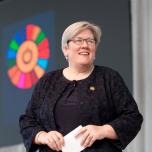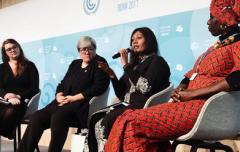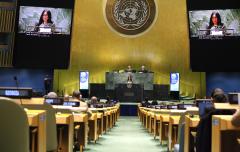Coal Cannot End Poverty
Why Countries Around the World Are Committing to Phasing Out Coal
This article first appeared on Devex.
Nov. 22, 2017: For many decades, the path of choice for closing global energy access gaps was extending electric grids and powering them with coal. Yet, even after spending trillions, grids today are still not reaching populations in secluded communities around the world, including the edges of cities, slums and remote rural areas. Even more toil with intermittent power from grids that are woefully inadequate.
For 1 billion people still lacking access to clean affordable electricity, daily living is a struggle. It’s difficult to enjoy reliable health care without power. It’s hard to stay warm in a classroom, let alone concentrate, if you’re cold. It’s hard to run a business profitably if the power is out for longer than it is on. It’s hard to start a business, cool crops and pump water without power.
Closing these energy gaps is an essential component for bringing emerging countries into the modern global economy. Countries in Sub-Saharan Africa and South Asia have the biggest gaps, but energy poverty also exists in island nations, indigenous populations, the highlands of the Latin America and other parts of Asia.
How do we reach those under-served populations more quickly and affordably? Do we wait for grids to be built and shoulder the huge expense of extending them to small communities in far-flung locations where the poorest, most-marginalized people live. Is there a legitimate role for installing more coal capacity into our future power grids, as President Trump and his team suggested at the UN Climate Conference (COP23) last week in Germany?
Or is there a more affordable path, a cleaner and safer path?
Today, the quickest way to connect these under-served populations and increase their contribution to local economies, to better educate their children, to enhance access to health services, is by leveraging abundant, ever-cheaper renewable energy resources. With similar or less financial support that is flowing to grids and with regulatory environments that allow them to co-exist with grids, decentralized and distributed renewable energy, such as solar, can provide a quicker, cleaner energy system for all.
These clean energy solutions are especially attractive if we factor in the social cost of carbon pollution that comes from coal. Coal-related air pollution kills hundreds of thousands of people every year. It also hurts agriculture productivity and broader economic productivity. That is why the United Kingdom, Canada, Mexico, three Pacific Island Nations, Angola, the Netherlands and nine other European countries—as part of a new alliance of more than 25 countries, provinces and American states—committed to phasing out coal last Thursday in Bonn.
Look no further than India, where lung-choking smog in the city’s capital shuttered 4,000 schools this month. “I don’t know if anyone has been to New Delhi recently, but you can’t breathe,” said India solar entrepreneur Ajaita Shah, who joined me on a panel at COP23 last week. “Our ‘efficient,’ ‘clean coal’ solutions are creating this smog.”
Another cost, of course, is coal’s vast footprint on global warming. It has been the biggest contributor by far, and it’s a reality we cannot ignore.
As a citizen of the United Kingdom, I know that our 19th and 20th centuries were shaped – prosperously – by coal. Those who mined it or used it for forging and smelting materials that built our world were proud contributors to past industrial revolutions. But the environmental harm of coal wasn’t known, and vested interests that did eventually study its damaging impacts shielded it from the public.
Now that coal’s indelible impact on the planet and our health is clear, it is time to move on. With cost-effective alternatives in our hands, we must do everything we can to support renewable energy. That means pricing carbon pollution and ending fossil fuel subsidies. It also means investing in the transition for communities whose proud traditions should be honored, but will not shape our children’s future.
“Your future does not have to be your past,” Pittsburgh Mayor Bill Peduto, whose city is shedding its coal-mining and steel-making legacy for a green future, said at COP23. “Time goes in only one direction. If you wait for the mills and mines to reopen, you’ll be left in the past.”
That some in the coal industry fight its decline is understandable, but it doesn’t make them right. It surely doesn’t make coal the answer for meeting the energy needs of the world’s most vulnerable populations– those with no access to energy. Suggestions of coal-fired power being pumped into grids that do not exist for these populations are disingenuous. This approach is not about ending energy poverty, it’s about providing a next generation of government payouts to a slurry of companies – many of them already in bankruptcy – to stay in a business that is in terminal decline.
This money can be much better spent on the future livelihoods of families with legacy ties to coal mining and, in a far bigger way, on immediate energy solutions like home solar systems, mini grids, and distributed systems integrated with battery storage.
As my friend Christiana Figueres, who helped win global approval of the Paris Climate Agreement, likes to say, coal had its day, it served many people well, but now it is time for it to retire.




